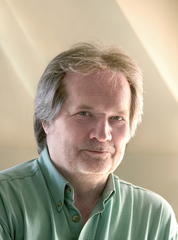
Musical modernism made a bold statement in the postwar decades. To this end, many composers of the 1950s, 60s and 70s broke from the past, creating an angular, dissonant kind of music that stood in direct opposition to the traditions of earlier times.
These were heady times for a young Hungarian named Peter Eotvos – talented both as a composer and a conductor. When the Moscow Conservatory rejected him for advanced musical studies, he applied to Germany. In 1966 he headed for Cologne, the epicentre of all that was avant-garde in European music.
“New possibilities to produce different sounds opened the musical imagination,” he says, fondly recalling his formative years. “At the same time, the culture was ready for a break with the Nazi era in art, literature and music.”
The chief reason for Eotvos’s visit to Canada was an invitation from the Toronto Symphony Orchestra to curate this year’s New Creations Festival. Beginning on Thursday, he’ll conduct four TSO programs over nine days – a mixture of his own music and works by other living composers. (As well, he’ll speak at Soundstreams’s Salon 21 lecture series on March 6, and will appear at a chamber-music program presented by New Music Concerts, on March 10. After that, he leaves Toronto to conduct the Montreal Symphony Orchestra, on March 15.)
The years have been good to Eotvos – and so has classical music. His works have been presented around the world. He’s led major orchestras in Berlin, Vienna, Amsterdam and Tokyo, among many other places.
While he hasn’t shunned the old-master composers, he’s best known for contemporary music. Thanks to his skills with difficult modernist scores, he served for many years as music director of Paris’s cutting-edge Ensemble Intercontemporain, and was principal guest conductor of London’s BBC Symphony Orchestra.
It was his close association with two of Europe’s leading postwar composers – Germany’s Karlheinz Stockhausen and France’s Pierre Boulez – that made him a key figure in the modernist movement.
And through them, he absorbed the ideologies. In its most extreme forms, modernism was overtly elite and combative. Boulez once called for the world’s opera houses to be blown up, and declared that anyone who wasn’t composing in an atonal serialist style was simply irrelevant. And, in the United States, the composer Milton Babbitt once penned an essay entitled Who Cares If You Listen?, in which he defended the obscurity of his cerebral music.
Eotvos stands by the modernist credo. According to him, it matters little that the music he champions hasn’t achieved widespread popularity.
“I don’t think it’s important,” he states emphatically. “If you start from a point of view of doing something for the public, you won’t create a new world. In every era of European culture, from the Middle Ages onward, the new was always exceptional.”
Moreover, he claims that modernism’s departure from tradition was a matter of historical necessity – and will eventually be recognized as such.
“Never give what the public asks,” he continues. “You must give the public what it needs – even if they do not always know it! Many people will understand 100 years later, and some people will understand immediately.”
Perhaps – but not too far into modernism’s march to future glory, it was sideswiped by postmodernism. Composers such as Arvo Part, John Tavener and John Adams challenged modernist ideas about musical progress and historical inevitability, and spearheaded a revival of tonality.
Today, the two camps don’t always play nicely together. Adams once dismissed Schoenberg – a revered figure among modernists – as “a religious zealot cutting off his genitals to prove how totally pure he is.”
Yet rather than jump into that kind of fray, Eotvos favours peaceful co-existence.
“Today, everything is possible for composers – and I accept it. Most significant for our time is individuality, so that each composer can produce his music as he wants.”
After a lifetime as a prominent figure in new music, he remains adamantly optimistic – and he doesn’t doubt that modernism still speaks to open-minded and adventurous listeners.
“Now, in Western Europe, we play the music of the 1950s and 60s with big success. At festivals, where I am a conductor and composer, there are full houses everywhere.” And just last month, he adds, he led a program of new music with the famously conservative Vienna Philharmonic.
And if the music he loves requires interpretive clarification, for the benefit of performers and audiences alike, that’s where he comes in.
“I’ve been conducting modern music for 40 years now. I understand what’s happening in this music and why.”
© Colin Eatock 2012
 RSS Feed
RSS Feed

